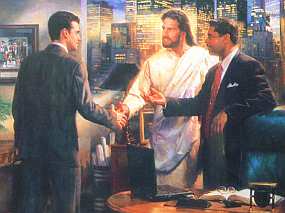(Back in August 2006, I wrote a post entitled The Real American Christian “Either/Or. If you haven’t read that post, please do. Today’s post riffs on the ideas found in that post.)
I had an opportunity to drive to see my youngest brother in Illinois before he left to do linguistics field work and data collection in Alaska. My middle brother and his family joined me on the trek west. Having attended a local Bible college, that brother has volunteered as a youth minister at his church for so long that he’s into his second generation of teens.We talked about many topics on the drive to Carbondale.
While discussing the state of the Church today, he made the following statement:
If you take a look at the average Evangelical Christian family in this country, they may talk about choosing to follow Jesus, but they didn’t. They chose money. That explains everything.
George Barna, the pollster who routinely looks at the state of the American Church, has noted that Evangelicals are more concerned that their kids get into elite colleges than that those same children follow Jesus Christ. The reasoning for that seems obvious. Graduating from an elite college means a higher-paying job.
Yesterday, I made this comment about men:
I want to believe that a man can work a sixty-hour week, spend quality time with his wife and kids, be involved in his community, find time for leisure, and still be an effective disciple of Jesus Christ. The kind of man who prays big prayers and knows God intimately for those prayers. The kind of man who readily leads many others to his Savior and disciples those same people to maturity. I want to believe, but I don’t know any men like that.
I’m not saying that a man like I describe can’t have an earnest desire to serve the Lord. But I question the ability to follow through on that desire. It’s a case of allegiance. Two masters; which will the average 9-to-5’er (or 8-to-6’er, as the case is today) serve?
Every survey out there on the state of the Church in 2008 notes drop-offs in attendance, participation in activities, and general involvement. The Church in this country is in poor shape. We have more megachurches than ever before and less spiritual health.
Meanwhile, the lost are proceeding to hell in an endless stream.
Who is actually doing the work of the ministry today? It’s a handful of people, mostly full-time Christian workers. It’s hard not to look at the way we do ministry in America 2008 and not see that most of us have stepped out of the ministry role Jesus commended of us and handed it off to someone else accompanied by a small envelope filled with a few bucks “earnest” money. That passes for active ministry in most people’s lives.
And why not? We’re making the big bucks. Why not farm out our responsibility to someone else? It’s The American Way™!
But it’s not Jesus’ way.
As I noted yesterday, I want to believe that the average Christian man working a middle management job in some cubicle in Conglomo Corporation can make a difference for Christ. But I don’t see it.  I see that same man’s large suburban tract home, his boat, his trips to Disneyworld, his 401k account, but I don’t see any impact for the Kingdom. Not when all the accounts are tallied and the bill comes due. Yet this passes for acceptable Evangelical living in America 2008.
I see that same man’s large suburban tract home, his boat, his trips to Disneyworld, his 401k account, but I don’t see any impact for the Kingdom. Not when all the accounts are tallied and the bill comes due. Yet this passes for acceptable Evangelical living in America 2008.
When asked if he would deny Christ, I’m sure that man would vehemently say no. And yet he appears to every day because in all the things that matter he’ll never choose Jesus. He’ll choose comfort. He’ll take the money and run. And he’ll make darned sure his kids can take the money and run, too, even if that means Jesus ends up the also-ran in his children’s lives.
I don’t want to think that it’s all about the Benjamins, yet it seems like it is. I know that I have difficult decisions to make in that regard, decisions I didn’t ever think that I—or any other man my age—would need to make. Perhaps our concessions to our Industrialized Age have forced our hands. Maybe no middle ground exists any longer. It just may be that all we can do is fall into line or else wind up scavenging for food from the neighborhood dump. Who wouldn’t want to avoid that fate?
And so we made our choice.

 No one wants to think about a pastor dying unexpectedly, but what if yours did?
No one wants to think about a pastor dying unexpectedly, but what if yours did? In fact, my wife’s family heartily encouraged me to try out for Millionaire in its heyday. I saw one show, one early one featuring the million dollar question “How far is the earth from the sun?” a question I thought most second graders were supposed to know, then wrote off the show.
In fact, my wife’s family heartily encouraged me to try out for Millionaire in its heyday. I saw one show, one early one featuring the million dollar question “How far is the earth from the sun?” a question I thought most second graders were supposed to know, then wrote off the show.